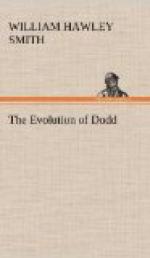But over all these misfortunes and follies alike came the lively thrashing of grandpa Stebbins, and brought the boy to a realizing sense of the situation. The young sinner found himself suddenly confronted with the penalty of his sin, and when he found that this penalty was really extreme suffering, he made up his mind that it was something worth looking out for.
To be sure, it was not a high motive to right action, but it was a motive that led to better deeds on the part of “Dodd” Weaver, and as such is worthy a place in this record. There was one man and one thing in the world that be had learned to have a decent respect for, and that was a new acquisition at this period of his life. So long as grandpa Stebbins lived, he and “Dodd” were fast friends, and when, years after, the old man went to his reward, there was no more genuine mourner that stood about his grave than the hero of these adventures.
Quarrel with the theory of corporal punishment as much as you choose, beloved, but when you get a case like “Dodd’s,” do as well by it as grandpa Stebbins did by him—if you can.
CHAPTER VI.
The “Fall School” in “deestrick” number four had been in session for more than a month when the Weavers moved into the country and came within its jurisdiction. Preparations were at once made to increase its numbers, if not its graces, to a very perceptible extent, from out of the bosom of the Weaver homestead; for, as the youngest twins were now “five past,” they were held by the inexorable logic of rural argumentation to be “in their sixth year,” and so to come within the age limit of the school law, and entitled to go to school and draw public money.
Besides, “Old Man Stebbins owns nigh onter six eighties in the deestrick, an’ pays more school tax nor ary other man in Dundas township, an’ it hain’t no more nor fair ’at ef he wants to send the hull family, he orter be ’lowed ter, coz he hain’t sent no one ter school fur more ’n ten year, only one winter, when Si Hodges done chores fer him fer his board, an’ went ter school,” explained old Uncle Billy Wetzel to a company of objecting neighbors, as they all stood together by a hitching post in front of the church, waiting for “meetin’ to take up,” whittling and discussing local affairs meantime.
So the five young Weavers, headed by “Dodd,” became members of the “fall school in deestrick four, Dundas township,” and were marched off for the day, five times a week, with dinner for the crowd in a wooden dinner pail, which was the special care of twins number one.
This laxity regarding twins number two would have been rebuked in a city where there is a superintendent kept on purpose to head off such midgets as these, who creep in under the legislative gates that guard the entrance to the road to learning, but no such potentate held sway in Dundas township, so the little bow-legged pair went to school unmolested and began, thus early, the heavy task of climbing the hill of knowledge, starting on their hands and knees.




